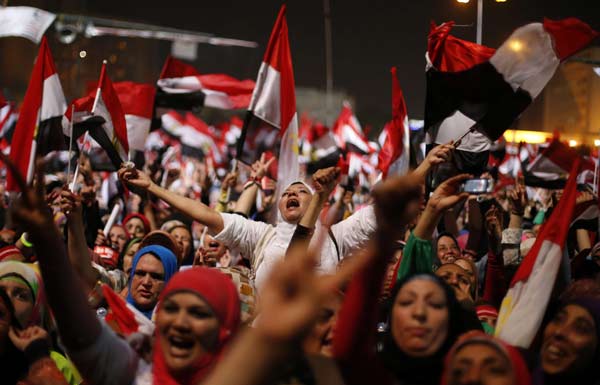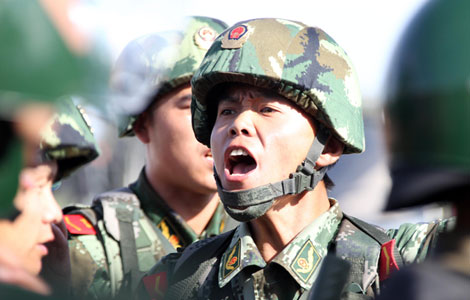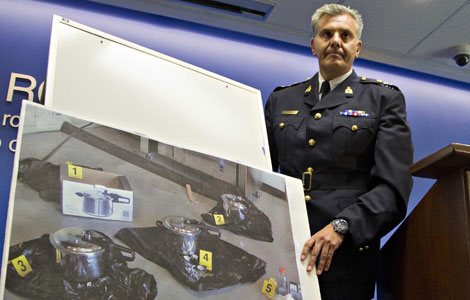Egypt army topples president, announces transition
Updated: 2013-07-04 06:53
(Agencies)
|
||||||||
 |
|
Protesters, who are against Egyptian President Mohamed Morsi, react in Tahrir Square in Cairo July 3, 2013. [Photo/Agencies] |
CAIRO - Egypt's armed forces overthrew Islamist President Mohamed Morsi on Wednesday, sparking wild rejoicing in the streets at the prospect of new elections as a range of political leaders backed a new political transition.
Morsi was sequestered in a Republican Guard barracks after denouncing a "military coup" that stripped him of power after just a year. As tanks and troops secured the area, tens of thousands of supporters of his Muslim Brotherhood rallied nearby to protest against his removal.
Morsi's dramatic removal after a year in office as Egypt's first freely elected president marked another twist in the turmoil that has gripped the Arab world's most populous country in the two years since the fall of Hosni Mubarak.
The liberals' chief negotiator with the army, former U.N. diplomat Mohamed ElBaradei, said the programme agreed with the generals during talks on Wednesday would ensure the continuation of the Arab Spring revolution of 2011.
Claiming a mandate from the people, millions of whom have protested against political upheaval and economic stagnation under Brotherhood rule, armed forces chief General Abdel Fattah al-Sisi said Morsi had failed to meet demands for national unity.
"Those in the meeting have agreed on a roadmap for the future that includes initial steps to achieve the building of a strong Egyptian society that is cohesive and does not exclude anyone and ends the state of tension and division," Sisi said in a solemn address broadcast live on state television.
He said the security forces would keep order. There were scattered clashes between rival factions around the country but so far nothing on the scale of violence in which more than 40 people have been killed and hundreds wounded in recent weeks.
Security sources said at least four died on Wednesday.
Sisi was flanked by his uniformed high command but also by a senior Muslim cleric, the Pope of Egypt's Coptic Church and political leaders ranging from liberals to a bearded Islamist representative from the ultra-Islamic Nour Party. Also present were youth leaders who were given special mention by Sisi.
References to the popular will, and the presentation of a united political front with a civilian face - which will take fuller shape on Thursday with the swearing in of the head of the constitutional court as interim head of state - clearly aims at scotching concerns abroad that this was a military coup d'etat.
The United States had backed Morsi's assertions to be the legitimate leader but had grown increasingly insistent that he share power with his opponents. Washington funds Sisi's army to the tune of $1.3 billion a year and could face questions on imposing sanctions if Morsi were deemed to be the victim of a coup.
The United States, as well as neighbouring Israel, and other powers are all watching anxiously to see whether Egypt, with its population of 84 million, powerful army and control of the Suez Canal, can stabilise itself.
Reflecting the hopes of the "revolutionary youth" who led the charge against Mubarak, only to see the electoral machine of the Brotherhood dominate the new democracy, the young man who proved Morsi's extraordinary nemesis said the new transitional period must not repeat the mistakes of the recent past.
"We want to build Egypt with everyone and for everyone," said Mahmoud Badr, a 28-year-old journalist who first had the idea two months ago for a petition calling on Morsi to resign. By last weekend, the "Tamarud - Rebel!" movement was claiming 22 million backers, many of whom were on the streets on Sunday.
Ultimatum
The army had already grown increasingly alarmed about Morsi dragging Egypt into the sectarian conflict in Syria and the turnout on the streets gave Sisi his justification for handing the president a 48-hour deadline to share power or lose it.
Morsi was the first of the mostly Islamist leaders who have taken power since the Arab Spring uprisings against autocratic leaders to be deposed in his turn. It will pose questions for others across the region, most immediately in Tunisia.
The country that gave birth to the demands for democracy two and a half years ago now has its own "Tamarud" movement, seeking to end the rule of Tunisia's Islamists in parliament.
On Tahrir Square, cradle of Egypt's January 25 Revolution in 2011, huge crowds in the hundreds of thousands set off fireworks and partied, chanting: "The people and the army are one hand!"
The past four days have seemed to many like a fast-motion rerun of the 18 days that brought down Mubarak, when the army which had long backed him realised his time was up.
Sisi announced the immediate suspension of the Islamist-tinged new constitution and a roadmap for a return to democratic rule under a revised rulebook.
The constitutional court president will replace Morsi. A technocratic government will rule until new presidential and parliamentary elections are held - no time frame was set.
The constitution will be reviewed by a panel representative of all sections of society in the biggest Arab nation. Media freedoms, under threat during Morsi's rule, would be protected.
Sisi mentioned Morsi by name only in a preamble in which he detailed how the armed forces chief - appointed by the president last year - had repeatedly tried to persuade him to end the deep polarisation of Egypt's politics. The president, he said, had "failed to meet the demands of the Egyptian people".
Tahrir erupts
After he spoke, hundreds of thousands of anti-Morsi protesters in central Cairo's Tahrir Square erupted into wild cheering, setting off fireworks and waving flags. Cars drove around the capital honking their horns in celebration.
But a statement published in Morsi's name on his official Facebook page after Sisi's speech said the measures announced amounted to "a full military coup" and were "totally rejected".
A shaky, hand-held video lasting 20 minutes appeared briefly online, showing Morsi speaking at a desk. He had pledged in an overnight broadcast to give up his life rather than relinquish his democratically elected responsibilities. In the new video, he said: "There is no other legitimacy, and it cannot be.
"I do not accept this at all," he said, while also urging his supporters not to take up arms as some have sworn to do.
The president was at a Republican Guard barracks surrounded by barbed wire, barriers and troops, but it was not clear whether he was under arrest. The state newspaper Al-Ahram said the army told him at 7 p.m. (1700 GMT) that his term was over.
The Brotherhood's Egypt25 television station, broadcast live coverage of a rally of tens of thousands of Morsi supporters, even as the army moved tanks to prevent them from marching on the presidential palace or the Republican Guard barracks.
But within an hour of Sisi's announcement it was off air.

 July 4 in Prescott: Balance of grief, patriotism
July 4 in Prescott: Balance of grief, patriotism
 Jubilant crowds celebrate after Mursi overthrown
Jubilant crowds celebrate after Mursi overthrown
 Growth slowing for services
Growth slowing for services
 Venezuela eyed as Snowden seeks asylum
Venezuela eyed as Snowden seeks asylum
 Anti-terror drill staged in Xinjiang
Anti-terror drill staged in Xinjiang
 Memorial service held for 19 Arizona firefighters
Memorial service held for 19 Arizona firefighters
 Canada vigilant after terror plot
Canada vigilant after terror plot
 Beckhams' star power shines
Beckhams' star power shines
Most Viewed
Editor's Picks

|

|

|

|

|

|
Today's Top News
Obama, Merkel agree talks on surveillance program
Filipino executed for drug trafficking
Obama orders US to review aid to Egypt
Snowden still in Moscow
China urges more efficient uses of fiscal funds
Egypt army topples president Mursi
China to strengthen ties with Uganda
Frankfurt aims to be key yuan center
US Weekly

|

|






